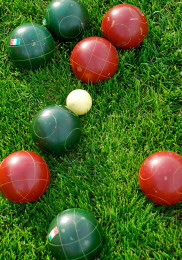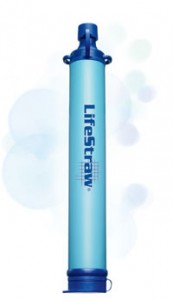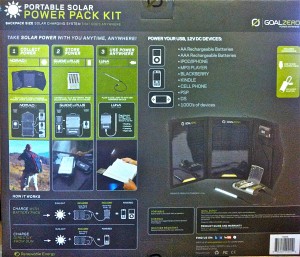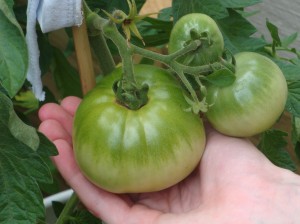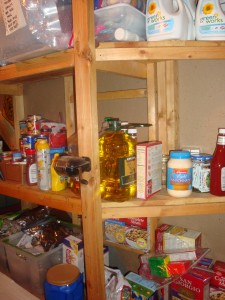At our house food storage is a complicated issue. We all face obstacles to our prepping, whether it is financial, lack of family support, or just being unknowledgeable. I grew up poor, so you might say I have “food issues.” And when I say poor, I mean that I really only finished my senior year of high school because they provided low-income families two free meals a day; for me the school part was just the filler between my meals. But what I did not realize until recently, thanks to the article: The 5 Stupidest Habits You Develop Growing Up Poor, is that growing up that way affects how I shop for food even today. After 20 years of marriage, with a much more substantial income, I was still shopping paycheck to paycheck. I had the mentality of only buying exactly what we immediately needed. But once I became a prepper, I had to retrain myself to “buy extra.”
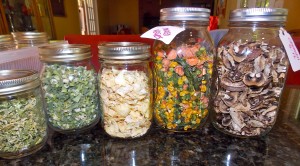 One obstacle of the ‘poverty cycle’ I was able to break, was my love of packaged foods. Packaged foods are cheap, have a long-shelf life, and feed more people than fresh foods do. Poor people eat lots of these, essentially training their bodies to expect high fat, high carb, and high sugar as the core of their diet. This causes their bodies crave these foods and, as a result, they tend to be frequently overweight, even obese. I was able to overcome this and have raised my children on fresh, home-made meals with plenty of vegetables. Though the flip-side of this is that it’s really hard to reconcile my love of fresh foods and wanting to stock my long-term food storage. To combat this personal conflict, we have been gardening and canning foods at home. I feel that at least then I can control exactly what ingredients are in my “canned” foods. (It has also been a great teaching tool for my children.)
One obstacle of the ‘poverty cycle’ I was able to break, was my love of packaged foods. Packaged foods are cheap, have a long-shelf life, and feed more people than fresh foods do. Poor people eat lots of these, essentially training their bodies to expect high fat, high carb, and high sugar as the core of their diet. This causes their bodies crave these foods and, as a result, they tend to be frequently overweight, even obese. I was able to overcome this and have raised my children on fresh, home-made meals with plenty of vegetables. Though the flip-side of this is that it’s really hard to reconcile my love of fresh foods and wanting to stock my long-term food storage. To combat this personal conflict, we have been gardening and canning foods at home. I feel that at least then I can control exactly what ingredients are in my “canned” foods. (It has also been a great teaching tool for my children.)
I do not believe that there is only one way to have/create/do food storage. I believe that how we choose to store food needs to be a reflection of our families and who we are as preppers. Here is my take on different types of food storage:
Food Storage Theory 1: Most preppers live by the simple motto “store what you eat, eat what you store.” This is the simplest way to store food, one giant pantry that is in a constant rotation as part of your daily household diet. Most commonly you will see shelves filled with canned and packaged foods, and buckets of rice and beans. It makes prepping very easy because your goal is to store the same things in increasingly larger quantity, and you never run the risk of waste because you know you will use it. I applaud people who do this because they are able to use everything without risk of waste. Although I have increased the amount of beans and other previously unknown foods my family eats, they will never be lovers of beans or packaged foods. This storage method simply doesn’t work for our family.
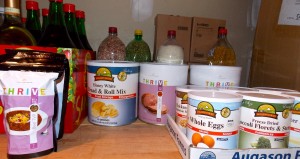 Food Storage Theory 2: This is the idea of having two separate food “pantries”, one that is for your regular rotational use and one that is exclusively long-term food storage (that you won’t eat unless the SHTF). The rotating pantry contains basic items that wouldn’t be the core of any diet, but that you do regularly eat, and could enhance the longer term food storage. At our house this is condiments, oils, canned vegetables, powdered broths, etc. The long-term food storage then consists of large quantities of beans, pasta, rice, TVP, and an assortment of canned and packaged foods that are NOT even part of our regular diet. This is a more expensive way to prep because you run the risk of possibly never using that long-term food storage and at some point you will have to decide what to do with it as it ages. This is how our family is storing food.
Food Storage Theory 2: This is the idea of having two separate food “pantries”, one that is for your regular rotational use and one that is exclusively long-term food storage (that you won’t eat unless the SHTF). The rotating pantry contains basic items that wouldn’t be the core of any diet, but that you do regularly eat, and could enhance the longer term food storage. At our house this is condiments, oils, canned vegetables, powdered broths, etc. The long-term food storage then consists of large quantities of beans, pasta, rice, TVP, and an assortment of canned and packaged foods that are NOT even part of our regular diet. This is a more expensive way to prep because you run the risk of possibly never using that long-term food storage and at some point you will have to decide what to do with it as it ages. This is how our family is storing food.
Food Storage Theory 3: This is a combination of the first two Theories, plus fresh foods from a garden and a renewable protein source raised at home (chickens, rabbits, goats, etc.). These are the people that are pushing for the greatest level of self-sufficiency should the SHTF. Many of us may never be able to attain this goal for a number of reasons. For instance, local ordinances restrict us from owning chickens, and although we are allowed to have rabbits, “processing” them at home is illegal. Even if we could, I’m not sure we would chose some of those options; I applaud those that can achieve this level of self-sufficiency.
My post next month will focus on specifics of food storage: container choices, canning and dehydrating, and purchasing bulk items from Costco or Sams Club. I would love to hear feedback from other preppers as to how they store food.










